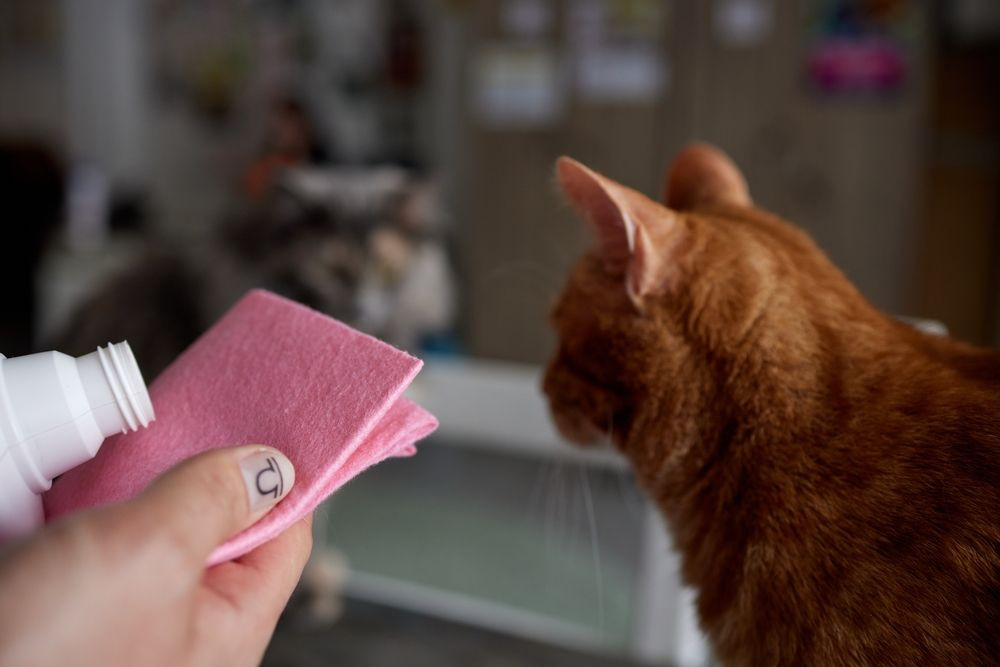Vinegar, a common household staple, is celebrated for its versatility, from culinary uses to cleaning prowess. For cat owners, the presence of vinegar in various forms around the home naturally raises a pertinent question: Is Vinegar Toxic To Cats? Given cats’ curious nature and tendency to explore every nook and cranny, understanding the safety of common substances is paramount for responsible pet parenting.
Decoding Vinegar: Is It Really a Feline Foe?
Vinegar, scientifically known as acetic acid, is indeed an acid, but it’s a weak one. This acidity is what grants vinegar its cleaning capabilities and distinct pungent smell. While the strong odor might be off-putting to us, what about our feline companions? The good news is that, in general, vinegar is not considered toxic to cats. It’s not categorized as a poison and won’t typically cause severe reactions if a cat happens to sniff or even ingest a tiny amount.
However, safety isn’t always black and white. While vinegar isn’t acutely poisonous, there are nuances to consider regarding cats and vinegar, particularly concerning ingestion and specific health conditions.
Vinegar Consumption: Should Cats Drink Vinegar?
While vinegar isn’t inherently toxic, allowing or encouraging your cat to consume vinegar is not advisable. There’s a significant lack of research on the specific effects of vinegar consumption in cats. While anecdotal evidence sometimes touts benefits, particularly for apple cider vinegar (ACV), these claims are largely unsubstantiated in feline health.
The primary concern with vinegar consumption is its acidity. Even diluted vinegar can irritate a cat’s sensitive stomach lining, potentially leading to gastrointestinal upset. Symptoms might include:
- Drooling
- Vomiting
- Loss of appetite
- Diarrhea
Furthermore, the strong taste and smell of vinegar are naturally repulsive to most cats. This aversion is actually beneficial, acting as a natural deterrent and reducing the likelihood of accidental ingestion in significant quantities.
Harnessing Vinegar’s Power: Safe Uses Around Cats
Despite the cautions around ingestion, vinegar’s properties can be safely and effectively utilized in various ways around your feline friend and home:
1. Litter Box Deep Cleaning Champion
 Is vinegar bad for cats: Image illustrating the use of apple cider vinegar as a natural repellent, a useful and pet-friendly approach for various purposes.
Is vinegar bad for cats: Image illustrating the use of apple cider vinegar as a natural repellent, a useful and pet-friendly approach for various purposes.
Litter boxes, while essential, can become odor hotspots. Vinegar is a fantastic natural solution for deep cleaning litter boxes and neutralizing lingering urine smells. After emptying the litter box, a soak with vinegar can work wonders.
How to use vinegar for litter box cleaning:
- Remove all litter and waste from the litter box.
- Pour a small amount of white vinegar into the empty litter box.
- Let it soak for 30 minutes to overnight to loosen dried urine and neutralize odors.
- Rinse the litter box thoroughly with water to eliminate any vinegar smell before refilling with fresh litter.
This method is effective because the acidic nature of vinegar breaks down the alkaline salts present in dried cat urine, effectively eliminating the source of the odor. Diluted vinegar can also be used to wipe down surfaces where cats may have walked, ensuring a clean and odor-free environment.
2. Natural Flea Deterrent (Use with Caution)
While not a primary flea treatment, some believe diluted vinegar solutions can act as a natural flea repellent. When mopping floors, adding a small amount of white vinegar to the water (approximately 1/3 cup per gallon of water) might help deter fleas and also offers the benefit of killing bacteria and mold spores. Always rinse with plain water afterward to remove any lingering vinegar.
Important Note: Vinegar should never be directly applied to a cat’s coat as a flea treatment. This can cause skin irritation and discomfort. Rely on veterinarian-approved flea prevention methods for effective flea control. Vinegar should only be considered a very mild environmental deterrent and not a treatment.
3. Sparkling Clean Food and Water Bowls
Cat food and water bowls can accumulate mineral deposits and bacteria, especially in areas with hard water. Regular cleaning is crucial for your cat’s health. Vinegar is excellent for removing these build-ups.
Cleaning bowls and fountains with vinegar:
- Soak food and water bowls in a solution of equal parts vinegar and water for about 30 minutes to an hour.
- For water fountains, run a diluted vinegar solution through the fountain system.
- Thoroughly rinse all bowls and fountains with water multiple times to completely remove any vinegar residue and odor before returning them to your cat.
For stubborn build-up, a paste of vinegar and baking soda can be more effective. Remember to always rinse thoroughly after using any cleaning solution.
4. Odor Eliminator for Cat Bedding
Vinegar is a natural odor neutralizer, making it ideal for washing cat bedding and blankets which can harbor lingering smells.
Using vinegar in laundry:
- Add about half a cup of white vinegar to the washing machine’s detergent drawer along with your regular pet-safe detergent.
- Wash bedding as usual. The vinegar will help to eliminate odors and will be rinsed away during the wash cycle, leaving no vinegar smell behind.
5. Cat Repellent for Specific Areas
Cats dislike the strong smell of vinegar, which can be strategically used to deter them from specific areas.
Vinegar as a cat repellent:
- Create a diluted vinegar spray by mixing equal parts vinegar and water in a spray bottle.
- Lightly spray (or dab with a vinegar-soaked cotton ball) areas you want to discourage your cat from accessing, such as furniture they scratch or rooms they shouldn’t enter.
- Reapply as needed, but be mindful that the scent will dissipate over time.
Vinegar can also be used outdoors to deter stray cats from gardens or yards, helping to protect your own cat’s territory and reduce unwanted feline visitors.
Apple Cider Vinegar and Cats: Separating Fact from Fiction
Apple cider vinegar (ACV) is often touted for numerous health benefits in humans and sometimes suggested for pets. Claims range from boosting immunity to improving skin health. However, scientific evidence supporting the benefits of ACV for cats is currently lacking.
While some anecdotal reports suggest ACV might help with skin issues or ear cleaning in cats, these are not backed by research. Furthermore, administering ACV orally to cats is generally not recommended due to the acidity and the lack of established safe dosages. Most cats are also naturally averse to the taste and smell of vinegar, making oral administration challenging and potentially stressful for them.
Vinegar and Cats with Kidney Disease: A Definite No-No
While vinegar is generally considered safe for healthy cats in diluted and topical applications, it is contraindicated for cats with kidney disease or related health conditions. Cats with kidney disease often require a carefully managed alkaline diet to support their kidney function. The acidity of vinegar can be detrimental and further burden their compromised kidneys.
If your cat has kidney disease or any pre-existing health condition, never administer vinegar internally or use it in ways that could lead to ingestion without consulting your veterinarian first.
Also Read: What’s the Best Food for Cats With Kidney Disease?
Conclusion: Vinegar – A Useful Household Aid, Not a Feline Toxin
In conclusion, vinegar is not toxic to cats in the sense of being a dangerous poison. Its strong smell acts as a natural deterrent, and when used diluted and externally, it can be a safe and effective natural cleaning agent and odor neutralizer around your feline home.
However, ingestion of vinegar is not recommended and can cause stomach upset. Furthermore, vinegar should be avoided for cats with kidney disease. Always prioritize your cat’s health and well-being by using vinegar responsibly and consulting your veterinarian for any concerns regarding your cat’s health or exposure to household products.
View Sources
Cats.com uses high-quality, credible sources, including peer-reviewed studies, to support the claims in our articles. This content is regularly reviewed and updated for accuracy. Visit our About Us page to learn about our standards and meet our veterinary review board.
- https://cats.com/how-do-you-keep-a-cat-out-of-a-certain-room
- https://www.petmd.com/dog/nutrition/can-pets-have-apple-cider-vinegar

